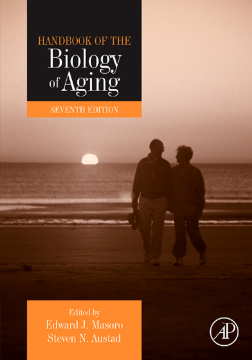
Additional Information
Book Details
Abstract
Handbook of the Biology of Aging, Seventh Edition, reviews and synthesizes recent findings and discoveries in the field. This volume is part of The Handbooks of Aging series, which also includes The Handbook of the Psychology of Aging and The Handbook of Aging and the Social Sciences.
The book is organized into two parts. Part 1 covers basic aging processes. It covers concepts relevant to clinical research, such as muscle, adipose tissue, and stem cells. It discusses research on how dietary restriction can slow down the aging process and extend life in a wide range of species. Part 2 deals with the medical physiology of aging. It contains several chapters on the aging of the human brain. These chapters deal not only with diseases but also with normal aging changes to cerebral vasculature and myelination as well as the clinical implications of those changes. Additional chapters cover how aging affects central features of human health such as insulin secretion, pulmonary and cardiac function, and the ability to maintain body weight and body temperature.
The volume is primarily directed at basic researchers who wish to keep abreast of new research outside their own subdiscipline. It will also be useful to medical, behavioral, and social gerontologists who want to learn about the discoveries of basic scientists and clinicians.
- Contains basic aging processes as determined by animal research as well as medical physiology of aging as known in humans
- Covers hot areas of research, like stem cells, integrated with longstanding areas of interest in aging like telomeres, mitochondrial function, etc.
- Edited by one of the fathers of gerontology (Masoro) and contributors represent top scholars in gerintology
"This is an important and timely book on an extremely critical subject, and although its technical excellence and depth will challenge those without a formal background in molecular biology, the rewards I believe will be deeply commensurate with the effort… However, with that qualification in mind, the articles are uniformly of high quality and address critical issues in the science of aging—several, if not many, of these reviews are good enough to be considered benchmark reviews, cogently summarizing the state of the science… For those interested in a benchmark series of reviews on aging, this volume has much to offer. I recommend it highly. For geriatric neuropsychologists, sophistication about the biology of aging should be considered a required area of competence."--Archives of Clinical Neuropsychology
